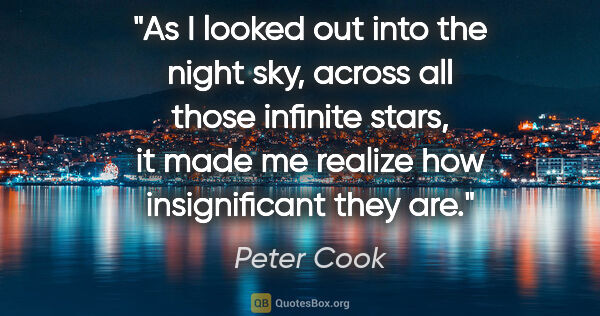Made Quotes (page 217)
In either case, there was very much the same solemnity of demeanour on the part of the spectators, as befitted a people among whom religion and law were almost identical, and in whose character both were so thoroughly interfused, that the mildest and severest acts of public discipline were alike made venerable and awful.
Nathaniel Hawthorne
The superannuated anarchist Kropotkin, made use of the war to disavow everything he had been teaching for almost half a century. This denouncer of the state supported the Entente, and if he denounced the dual power in Russia, it was not in the name of anarchy, but in the name of a single core of the bourgeoisie.
Leon Trotsky

...he [Samuel Butler] made a practise of doing the forks last when washing up, on the grounds that he might die before he got to them. This is very much his principle of 'eating the grapes downwards', so that however many grapes you have eaten the next is always the best of the remainder.
Philip Larkin
Pandas and rain forests are never mentioned when it comes to the millions of people taking joyrides in their Range Rovers. Rather, it's the little things we're strong-armed into conserving. At a chain coffee bar in San Francisco, I saw a sign near the cream counter that read NAPKINS COME FROM TREES - CONSERVE! In case you missed the first sign, there was a second one two feet away, reading YOU WASTE NAPKINS - YOU WASTE TREES!!! The cups, of course, are also made of paper, yet there's no...
David Sedaris
Literature is, to my mind, the great teaching power of the world, the ultimate creator of all values, and it is this, not only in the sacred books whose power everybody acknowledges, but by every movement of imagination in song or story or drama that height of intensity and sincerity has made literature at all. Literature must take the responsibility of its power, and keep all its freedom: it must be like the spirit and like the wind that blows where it listeth; it must claim its right to...
William Butler Yeats
Uncle alone in the house with the children said he'd dress up to amuse them. After a long wait, as he did not appear, they went down and saw a masked man putting the table silver into a bag. 'Oh, Uncle,' they cried in delight. 'Yes, isn't my make-up good?' said Uncle, taking his mask off. Thus goes the Hegelian syllogism of humour. Thesis: Uncle made himself up as a burglar (a laugh for the children); antithesis: it WAS a burglar (a laugh for the reader); synthesis: it still was Uncle...
Vladimir Nabokov
The most satisfying compliment a reader can pay is to tell me that he or she feels personally addressed. Think of your own favorite authors and see if that isn’t precisely one of the things that engage you, often at first without your noticing it. A good conversation is the only human equivalent: the realizing that decent points are being made and understood, that irony is in play, and elaboration, and that a dull or obvious remark would be almost physically hurtful.
Christopher Hitchens
Well, you know that was the worst of it - this suspicion of their not being inhuman. It would come slowly to one. They howled and leaped, and spun, and made horrid faces; but what thrilled you was just the thought of their humanity - like yours - the thought of your remote kinship with this wild and passionate uproar. Ugly. Yes, it was justly enough; but if you were man enough you would admit to yourself that there was in you just the faintest trace of a response to the terrible frankness of...
Joseph Conrad
Then there is the tamarind. I thought tamarinds were made to eat, but that was probably not the idea. I ate several, and it seemed to me that they were rather sour that year. They pursed up my lips, till they resembled the stem-end of a tomato, and I had to take my sustenance through a quill for twenty-four hours. They sharpened my teeth till I could have shaved with them, and gave them a "wire edge" that I was afraid would stay; but a citizen said no, it will come off when the enamel does" -...
Mark Twain

